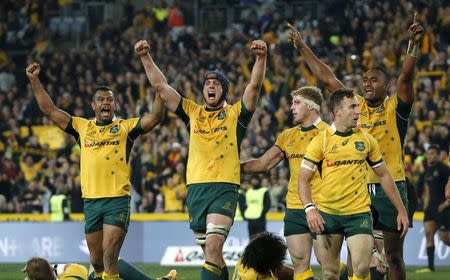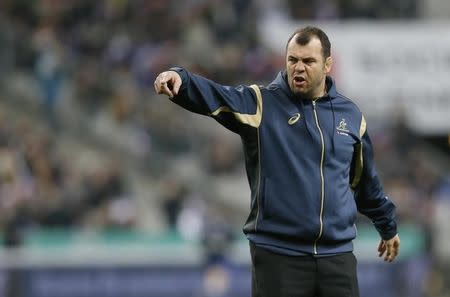Wallabies bank on the 'Cheik-effect' for World Cup success
By Nick Mulvenney SYDNEY (Reuters) - Australia have undergone quite a revival since Michael Cheika took the reins last year but it remains to be seen if 10 months is really enough time to put together a Wallabies side capable of delivering a third World Cup. Although victories over Argentina, South Africa and New Zealand to win this year's Rugby Championship were evidence that Australia can beat anyone on their day, a 41-13 loss to the All Blacks was a reminder that consistency is still lacking. Faced with the toughest pool in the history of the World Cup, which also features hosts England and Wales, Australia know that even qualifying second means they would probably have to beat the Springboks and All Blacks to get to the final. Their prospects look a lot better, however, than they did when Ewen McKenzie stunned Australia by resigning following disappointing results on the pitch and controversy off it. Charismatic former Leinster and New South Wales Waratahs boss Cheika took over as the third coach in 13 months and showed no inclination to manage existing resources and hope that something of quality would evolve. He was the driving force behind Australia's decision to allow players based abroad to represent the Wallabies if they had won 60 caps and welcomed back Toulon centre Matt Giteau and winger Drew Mitchell. While McKenzie would not pick players heading abroad, Cheika virtually dragged tighthead lock Kane Douglas off the plane on his arrival back in Australia after he cut short his stay in Ireland. Faced with having two of his best players, and leaders, playing in the same position, he took a shot at playing both David Pocock and Michael Hooper in the same back row and came away with a first win over the All Blacks in four years. He spoke on his first day in the job about needing to fix the weaknesses, both real and perceived, in the scrum and brought Argentine great Mario Ledesma over to help. In his playing days Cheika was a combative number eight at the Randwick club where he would help set the platform for the likes of Mark Ella and David Campese. EXPANSIVE RUGBY He has always shown a belief that teams must establish their right to play expansive rugby in the early collisions of the big men. So although Australia boast a potentially potent backline, Cheika tried to cram as much forward muscle into his squad as possible, eventually settling for a 17-14 split. An acknowledgement of the need to "bring something different" and test his combinations in the heat of international rugby led him to chop and change his team over the Rugby Championship. The downside to that was uncertainty, and there can be few in Australia who would predict with confidence who will be wearing the key number nine and 10 shirts when the Wallabies play their first Pool A match against Fiji in Cardiff on Sept. 23. Cheika, however, has shown scant regard for shirt numbers in his commitment to 23-man rugby, with the eight men on his bench long branded "finishers" rather than replacements. Despite Ledesma's work, question marks will always remain about Australia's tight five and Cheika's decision to take captain Stephen Moore and the injury prone Tatafu Polota-Nau as his only hookers could come back to haunt him. While both England and Wales will fancy their chances of putting pressure on Australia up front, a backline featuring fullback Israel Folau, centre Tevita Kuridrani and mavericks Kurtley Beale and Quade Cooper will always give them a chance. And if the forwards can gain parity at least in each match, then winning a third World Cup on British soil after 1991 and 1999 might not be the pipe dream it looked last year. (Editing by Ed Osmond)

 Yahoo News
Yahoo News 

